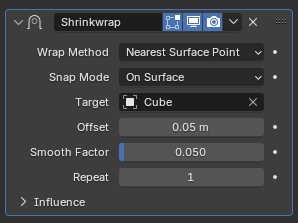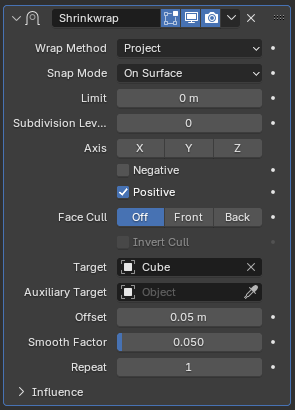Modificador Envolver¶
El modificador Envolver permitirá que un objeto de Grease Pencil se «envuelva» sobre la superficie de otro objeto. Moverá cada punto del objeto de Grease Pencil modificado hasta la posición más cercana sobre la superficie del objetivo.
Ver también
Ver también
Este documento hace referencia al modificador Envolver específico para objetos de Grease Pencil. Para su uso en otros tipos de objetos, ver la sección del Modificador Envolver genérico.
Opciones¶

El modificador Envolver, usando el método Punto más cercano de la superficie.¶
- Método de envoltura
Este selector permitirá especificar el método a ser usado para determinar el punto más cercano sobre la superficie del objetivo para cada punto del objeto de Grease Pencil modificado. Algunas opciones agregarán algunos controles específicos adicionales al panel. Ver Métodos de envoltura para una explicación de cada método.
- Modo de adherencia
La mayoría de los modos soportan una opción adicional para controlar la forma en la que los puntos serán movidos hasta el punto de la superficie del objetivo determinado por el método utilizado. El resultado de algunas de las opciones sólo diferirá en caso de que el valor de la opción Desplazamiento fuera distinto de cero.
- En la superficie:
Los puntos siempre serán movidos. El desplazamiento será aplicado a lo largo de la línea de proyección que conecte a cada punto original con el punto seleccionado para él sobre la superficie del objetivo, en dirección hacia la posición original del punto en el objeto de Grease Pencil modificado.
- Interior:
Los puntos no serán movidos en caso de que ya se encontraran en el interior del objetivo. La opción Desplazamiento contraerá el volumen permitido hacia el interior, siguiendo las líneas de proyección.
- Exterior:
Los puntos no serán movidos en caso de que ya se encontraran en el exterior del objetivo. La opción Desplazamiento expandirá el volumen permitido hacia el exterior, siguiendo las líneas de proyección.
- Fuera de la superficie:
Igual que En la superficie, pero el desplazamiento siempre será aplicado en dirección hacia afuera del objetivo.
- Encima de la superficie:
Igual que En la superficie, pero el desplazamiento será aplicado en la dirección de las normales suavizadas del objetivo.
Nota
Las opciones Interior y Exterior podrán ser usadas como una forma rudimentaria de detección de colisión. La discriminación entre interior y exterior será hecha en base a las normales del objetivo y no siempre producirá un resultado estable, sobre todo cuando la orientación de la malla del objetivo se acerque a los 90 grados o más.
- Destino
El objetivo de envoltura; la malla a la cual se envolverá el objeto modificado.
- Desplazamiento
La distancia que deberá ser mantenida con respecto a la posición objetivo calculada.
- Factor de suavizado
Cantidad de suavizado a ser aplicada.
- Repetir
La cantidad de iteraciones de suavizado a aplicar.
Influencia¶
Métodos de envoltura¶
Punto más cercano de la superficie¶
Este método seleccionará el punto más cercano sobre la superficie del objetivo.
Proyectar (o Proyecto)¶

Modo Proyectar.¶
Este método proyectará los vértices a lo largo del eje especificado hasta que se encuentren con la superficie objetivo. Los vértices que nunca entren en contacto con la superficie del objetivo se dejarán intactos.
- Limitar
Límite de distancia entre el punto original y la superficie. En caso de que la distancia fuera superior a este límite, el punto no será proyectado sobre la superficie objetivo.
- Niveles de subdivisión
Permitirá aplicar una subdivisión Catmull-Clark (temporal) a la geometría del objeto modificado, antes de calcular la envoltura.
- Eje
Permitirá definir a lo largo de qué eje local del objeto modificado deberá calcularse la proyección. Podrán activarse varios ejes simultáneamente, resultando en un «eje promedio» de proyección. En caso de que ningún eje estuviera activo se utilizará la dirección de las normales.
- Negativa / Positiva
Estas opciones permitirán seleccionar las direcciones permitidas de envoltura, a lo largo del eje seleccionado. En caso que ambas opciones se encontraran activas, ambos lados serán evaluados y se seleccionará el impacto más cercano.
- Descartar caras
Permitirá evitar cualquier proyección sobre el lado «frontal» o «trasero» de las caras del objetivo. El lado de una cara estará determinado por su normal (siendo el lado frontal, el lado desde el cual se origina la normal).
- Invertir descarte
Cuando la opción Descartar caras se encuentre activada y se permita la dirección Negativa a lo largo del eje, esta opción podrá ser usada para invertir la elección de descarte Frontal o Trasera para la dirección Negativa. Esto resultará útil al proyectar en ambas direcciones.
- Objetivo auxiliar
Un objeto adicional sobre el cual proyectar.
Vértice más cercano¶
Este método permitirá adherir vértices al vértice más cercano del objetivo. No existirán opciones adicionales.
Este método no soporta la opción Modo de adherencia.
Proyectar hacia normales del objetivo¶
Este método es similar a Punto más cercano de la superficie, pero producirá una proyección mucho más suave, a cambio de ser significativamente más lento de calcular.
En vez de buscar el punto más cercano, buscará el punto más cercano que tenga su normal suavizada interpolada apuntando hacia (o alejándose de) la posición original del punto. Los bordes limítrofes no desplegables serán especialmente tratados como cilindros infinitamente delgados que emiten normales en todas las direcciones perpendiculares; se ignorará el sombreado facetado.